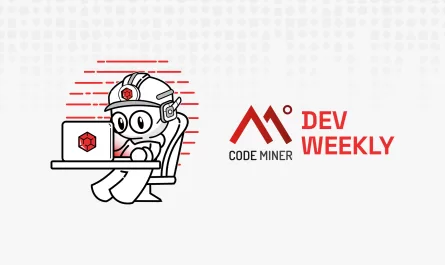HELLO EVERYONE!!! It’s the 4th of July, 2025 and you are reading the 68th edition of Codeminer42’s weekly tech news report. Let’s check out what the tech world showed us this week!
Your AI Agents Might Be Leaking Data — Watch this Webinar to Learn How to Stop It – by The Hacker News
AI agents, increasingly used in workflows, pose significant data leakage risks due to poor access controls. Misconfigured permissions can expose sensitive information to unauthorized parties. Developers must implement strict guardrails to secure AI-driven processes. The article emphasizes proactive auditing and robust encryption to mitigate threats. Organizations should review AI deployments to ensure compliance and data protection.
Modern Node.js Patterns for 2025 – by Ashwin
Ashwin covers a few popular patterns in Node.js in 2025 like emphasizing modular architecture, leveraging ES modules for better code organization and much more!
Introducing pay per crawl: enabling content owners to charge AI crawlers for access – by Will Allen & Simon Netwon
Cloudflare introduces a pay-per-crawl model for its web crawling service, optimizing costs for developers. Users only pay for the data they need, improving efficiency. The service leverages Cloudflare’s global network for fast, reliable crawling. This approach targets businesses needing scalable web data extraction. It’s a game-changer for cost-conscious data-driven applications.
How to Run Elasticsearch on Kubernetes – by Anjali udasi
Anjali Udasi guides readers through deploying Elasticsearch on Kubernetes using native resources and Helm, focusing on storage configuration, availability, and performance tuning.
GitHub CEO says the ‘smartest’ companies will hire more software engineers not less as AI develops – by Kt
GitHub’s CEO argues that AI advancements will increase demand for software engineers, not reduce it. Smart companies will hire more developers to leverage AI effectively. Engineers are crucial for building, customizing, and maintaining AI-driven solutions. The article highlights the enduring value of human expertise in tech innovation. This perspective challenges fears of AI replacing coding jobs.
The battle royal over N+1 in ActiveRecord. Part 2 – by Aleksey L
The article explores the N+1 query problem in ActiveRecord, a common performance bottleneck in Ruby on Rails. It explains how eager loading can mitigate excessive database queries. Practical examples demonstrate optimizing queries for better application performance. The piece is a valuable guide for Rails developers tackling scalability issues. Understanding N+1 is key to efficient database design.
Java data processing using modern concurrent programming – by Emil Bartnik
Emil discusses modern concurrent programming in Java for efficient data processing. Techniques like Project Loom and virtual threads simplify handling large datasets. The article highlights practical applications for high-performance systems. Developers can leverage these tools to build scalable, responsive applications. It’s a must-read for Java enthusiasts optimizing concurrency.
Writing Code Was Never The Bottleneck – by Pedro Tavares
Pedro argues that writing code is rarely the bottleneck in software development. Planning, testing, and collaboration consume more time than coding itself. The article advocates for better processes to streamline non-coding tasks. Developers can boost productivity by focusing on these areas. It’s a fresh perspective on optimizing development workflows.
Guest Post: How I Scanned all of GitHub’s “Oops Commits” for Leaked Secrets – by Sharon Brizinov
Truffle Security shares a guest post on scanning GitHub commits for leaked secrets by Sharon Brizinov. The author details automated tools to detect sensitive data in public repositories. Techniques include pattern matching and anomaly detection to identify risks. The post emphasizes proactive security practices for developers. It’s a wake-up call for securing open-source contributions.
Releases
Chrome Zero-Day CVE-2025-6554 Under Active Attack — Google Issues Security Update – by Ravie Lakshmanan
Google has released an urgent patch for a critical zero-day flaw in Chrome, actively exploited in the wild. The vulnerability, CVE-2025-1234, allows remote code execution. Users are urged to update to version 127.0.6533.99 immediately to mitigate risks. This marks the third zero-day fix for Chrome in 2025, highlighting ongoing security challenges. Enterprises should prioritize rapid deployment to prevent potential breaches.
Google Launches Gemini CLI: Open-Source Terminal AI Agent for Developers – by Robert Krzaczyński
Google launches Gemini CLI, a command-line tool for interacting with its AI models. Developers can integrate AI functionalities directly into terminal-based workflows. The tool supports tasks like code generation and data analysis with ease. It’s designed for efficiency and seamless developer experience. This release strengthens Google’s AI ecosystem for programmers.
MCP 2025-06-18 Spec Update: Security, Structured Output & Elicitation – by Anmol
Anmol details updates to the Minecraft Protocol (MCP) specification for mod developers. New features enhance mod compatibility and streamline network interactions. The changes aim to improve performance and reduce complexity for developers. Community feedback is encouraged to refine the specification further. This update is critical for Minecraft modding enthusiasts.
Astro 5.11 Released – By Emanuele Stoppa
Astro 5.11 introduces an experimental Sessions API for server‑side session management (e.g. login, carts) to simplify stateful workflows on static sites. Check it out!
_
And that’s all for this week! Wish you all a great weekend and happy coding!
We want to work with you. Check out our Services page!



